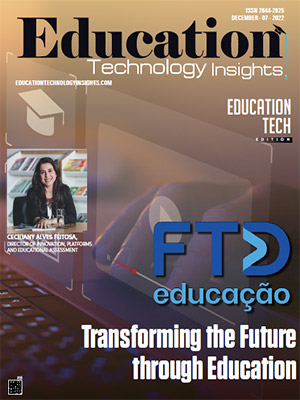THANK YOU FOR SUBSCRIBING
Be first to read the latest tech news, Industry Leader's Insights, and CIO interviews of medium and large enterprises exclusively from Education Technology Insights
A Voice-Enabled Language Translation Platform
Elias Parra, Global Operation Director, UTEL Universidad
Elias Parra is the Global Operations Director of UTEL Universidad. With more than 16 years of experience in education and technology, he has spent much of his career leading digital transformation across reputed organizations. His expertise in analytics, multi-disciplinary team development, innovation and goaloriented skills has made him a dexterous leader in the education tech space.
How would you describe your Journey with UTEL Universidad, and what are your key responsibilities here?
As the global operations director of UTEL Universidad, my role is to open different language versions of our online university to fulfill the demands of emerging markets. By integrating and coordinating the sales and marketing team, student success, customer service and academic operations, I intend to provide a better experience for all our students.
What are some of the significant trends existing in the market today?
When the pandemic paved the way for many schools to shut down permanently, it also helped many educational organizations to bring in more innovative ways of education. As a result, video technology tools like zoom, google meet, and Microsoft team began to be used prominently to bridge the education gap caused due to lockdowns.
The technological advancements during the pandemic brought a generational change in teaching; forcing teachers to upskill their technical skills and the way they teach, which caused many teachers to retire. At UTEL Universidad, we have been providing online distance education for more than 11 years. And the pandemic helped us explore territories outside of our comfort zone. As a result, we are now providing short-term and long-term education programs to marginalized communities.
The faculty and student community are using technology to help convey the video/online class contents in the student’s preferable language for better understanding. Research is being conducted using AI to create and adapt the content of the videos. If this experiment succeeds, it can also be assimilated into education.
“At UTEL Universidad, we incorporate simultaneous English, Spanish, Filipino, Indian and Australian accent or different language translations in synchronous with teaching sessions or open classes.”
Please shed some light on some of your recent projects.
We are working to find cost-effective adaptation and translation tools to provide affordable higher education for students. In order to find the right translation and transcribing solution, we have constantly been experimenting with AI and other tools available in the market. Our in-depth research helped us find MCAT, a low-cost tool used by most translation companies to acquire word-by-word meaning.
We depended on several startup companies to study and develop economical AI solutions in translation. Working with them revolutionized the way we translate and transcribe our existing content to English. And we started following a two-step process for transcribing. The first step involved translating content from languages like Spanish, French, or vice versa using AI. This showcased 60-70 percent accuracy. The second process comprised manual work involving a proof reading team and an instructional designer team to evaluate and understand the AI translation. This step-bystep analysis optimizes the translation and prevents possible errors.
Translating and transcribing online/ video classes is yet another arduous task. We first resorted to professional studios to translate the content. Since it was not cost-effective, we experimented with different AI tools. So far, we have trialed 10 to 15 of them and are still in the discovery phase. To give a global aspect to the content, American, Indian, Filipino, Latin, and Australian accents were added to the software. These accents and voiceovers are then mapped into the videos by our product team, comprising around 30 people working worldwide. The next project initiative we are working on is to synchronize simultaneous translation in various languages with teaching sessions or open classes.
In light of your experience, what will be your advice to fellow peers and industry leaders?
We must be open-minded and welcoming and grow our network to try new things. If it doesn’t work as planned, learn from the mistakes and keep testing and trying until the results are achieved. The technological advancements in today’s world have left us with many opportunities, and it would be a shame not to try.
Weekly Brief
ON THE DECK
Read Also
Building Future Leaders with Faith and Integrity
Building Practical Readiness in Cybersecurity Talent
Virtualization as a Bridge For Multi-Campus Support
The Liberal Arts to the Rescue
Faith Based Counseling Supporting Holistic Student Growth
Will ChatGPT End Higher Ed? Not So Fast

I agree We use cookies on this website to enhance your user experience. By clicking any link on this page you are giving your consent for us to set cookies. More info

























